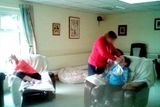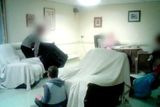Health watchdog shines cold light on the dark side of disability care
In an exclusive interview, Hiqa boss Phelim Quinn talks about human rights abuses in care centres



Listening to Phelim Quinn talk for an hour and a half about the living conditions many people with disability endure in residential centres is a depressing trip back in time.
The former nurse from Northern Ireland became chief executive of the Health Information and Quality Authority (Hiqa) in November last year, one year after the health watchdog first began inspecting residential centres for people with intellectual disabilities.
Since then, Hiqa has turned over a stone on perhaps the most neglected and overlooked sector of the health service, revealing in many cases, institutions and staff stuck in a time warp.
In Hiqa's modern head office in 21st century Ireland, Quinn talks about "institutions stuck in the 1960s or 1970s", about "impersonal service", "human rights abuses", vulnerable people restrained to the point that their human rights are being violated; nurses and health professionals so "culturally ingrained" in a backward system that they did not recognise the inappropriateness of their actions.
These are issues that come up regularly at often "upsetting" meetings with Hiqa inspectors.
"We had people living with very, very little autonomy, very, very little choice and no real consent in some instances about the way they lived," he says.
In some cases, the services are "extremely impersonal."
"Our inspectors have found that people get up when they are told to get up, there is no choice about when they get up, there is no choice about what they have for breakfast, they eat with everybody else. At times your personal hygiene routines are routinised," he says.
"If we were to think about the people living within these services having the same sorts of choice and privacy and dignity that we all have living within our own homes, it's very, very different."
He cites the overuse of chemical restraint - or drugs - to suppress residents; keeping them in seclusion; using physical restraints. "Lap belts and other forms of restraints within chairs, right to the point where people may be barred in their chair with the use of a table or something like that," he says.
Nurses and care staff will tell you they have to cope with challenging and sometimes violent behaviour on a 24/7 basis in a cash-strapped environment. According to Quinn, they are "ingrained in a culture".
"I suppose the key issue for us is that people working within these services sometimes have lost sight of the fact they are abuses of that individual's human rights, and as a result I think they become acclimatised to the use of those things without necessarily reflecting on the impact that might have on the individual," he says.
He admits that "as a nurse myself I find it hard to believe you could become accustomed or acclimatised to those sorts of practices.
"Remember, as well, that nurses in these instances supervise care staff to actually use these restraints as well, so they are learning from the example of those that are supervising them."
Quinn had worked in community nursing, mental health nursing and disability nursing in Northern Ireland before moving into regulation. He came to Dublin to join Hiqa as Director of Regulation in 2012 and was in that post when Hiqa first got the regulatory powers to inspect disability centres in November 2013 (it also regulates hospitals, nursing homes and children's homes).
Since then, it has inspected 760 of the 959 residential centres and units in Ireland, where more than 8,000 people live. Across 1,172 visits, most failed to meet the standards set by Hiqa.
Seventy seven were inspected three times or more, indicating serious compliance issues, but the biggest problems are in the larger institutions. Twenty centres - both voluntary and run by the Health Service Executive - have been served written notices that could result in closure unless standards improve.
The standards place as much emphasis on treating residents with dignity and respect, as safety, cleanliness and hygiene. So it is shocking that so many were found to be so wanting.
A cursory perusal of Hiqa's inspections reports reveals some pretty harrowing and ugly detail. At Cregg House in Sligo - home to 100 adults and children with disability - children were kept in bed until 1pm because there weren't enough staff on duty to take care of them. Meals were served at midday because the staff took theirs between 12.45pm and 2pm. An adult was "chemically restrained" 13 times over a matter of months. According to a nurse "it was better to give the chemical restraint at the start of the outburst otherwise it could "go on" for two hours.
At another centre for elderly people with intellectual disability, run by the Daughters of Charity in Roscrea, a resident bizarrely purchased garden furniture, a leather three-piece suite and a television which were used by everybody in the centre. The resident was later reimbursed. A car, bought and paid for by a resident for their own use, was also being used by everyone else.
At Aras Attracta, the now infamous residential centre in Mayo, Hiqa found staff using inappropriate language, "distressing scenes" especially at mealtimes. But it took RTE's investigation unit to expose alleged physical and verbal abuse.
Although the HSE made some improvements, one unit at the Aras Attracta centre has since been threatened with closure by Hiqa. Six staff have been charged with assault and others are being investigated.
It took RTE to expose what Hiqa could not. Quinn says Aras was a "wake-up call" but he draws the line at sending in undercover inspectors, an idea floated by the mental health services minister Kathleen Lynch. "I think we have to be very mindful as a state agency of not actually becoming embroiled in rights abuses through the covert filming of individuals without their consent," he says.
Instead, inspectors rely on unannounced inspections. "We have had inspectors actually observe these sorts of [poor] practices when they are in the room. So it appeared to us that people didn't recognise others might see what they were doing was wrong," he says.
He refers to examples of residents being physically restrained or, in one case, administered food through a peg feed (a tube through the stomach) while sitting in a day room full of people. "That person should have been removed to somewhere more private."
He called on the Government to introduce new legislation to protect vulnerable children and adults by making their neglect, financial abuse and other restrictive practices an offence.
He believes personal accountability of those involved in poor care practices - something not often seen in the health service - "needs to be looked at".
However, the service provider - whether the HSE or voluntary agency - is ultimately responsible, he says. The HSE can't be pleased with the level of fire fighting it has to do with each damning Hiqa report on its residential disability centres but Quinn says his relationship with the HSE's directorate is "constructive" and "professional" - despite threats of legal action recently over Hiqa's damning report on maternity services in Portlaoise.
The health authority and health watchdog are singing off the same hymn sheet on this issue. All the experts want to move away from "congregated living" to small units in communities, with care packages tailored to each person's needs, which is not cheap. The HSE has asked the Government for €250m to move residents into smaller, community-based units.
Hiqa came in for scathing criticism at the Irish Nurses and Midwives Organisation conference earlier this year. One delegate questioned whether Hiqa had actually achieved anything. Another called Hiqa's work "paper exercises in rubbish".
In the past it has been accused of being overzealous, obsessing over dirt and not taking enough note of the human warmth between staff and residents.
Quinn says he found this criticism disappointing.
"Certainly I think the picture painted sometimes of an inspectorate is of an inspector rubbing their finger across a shelf to see how much dust is on that shelf. That is not what we do," he says.
Increasingly, Hiqa's work is about ensuring the system and staff respect the rights of individuals, he says.
"And that doesn't always mean that they live in a pristine environment, that everything is as it should be all of the time.
"It means that staff treat an individual with dignity, with respect. They are afforded dignity when dignity is needed. They are afforded choice.
"They have levels and degrees of community integration.
"That's not about physical environment. That is actually about care and support and respect," he says.
Join the Irish Independent WhatsApp channel
Stay up to date with all the latest news

















